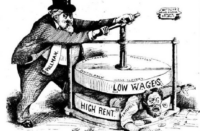- Just before thousands of students agonise once again over the question of Lear’s madness and other issues, Socialist Voice presents a Marxist view, based on understanding Shakespeare’s times.
Shakespeare lived in early capitalist society, marked by an uninhibited pursuit of power on the one hand and a new, humanist image of humankind on the other. The disappearance of old hierarchies not only made possible utopian thinking about a new and equal society, it simultaneously unleashed the potential for unrestrained, extreme self-interest.
Humanism and Machiavellianism are the inherent potentials in Renaissance society. Shakespeare warns against the Machiavellian, inhuman potential in all his tragedies and pitches it against the alternative: humanism. It is this warning that makes Shakespeare’s plays so completely relevant for us today, who live four hundred years later yet in the same society of capitalism.
The main social forces in the play
Lear is a feudal absolute monarch who has lost touch with his people and with his own understanding. His is the strictly ordered feudal world, where a person’s place within the hierarchy was clearly defined and could not be changed.
Lear is incapable of understanding the kind of disrespect shown to him by his elder daughters. Their disregard for him and for his dignity once he has handed over to them his power and his kingdom shatters his world completely. When he abandons the society he has known, ejected from it by his daughters, he goes out onto the heath as a man who has lost everything.
The raging tempest on the heath symbolises what is going on in Lear’s head. In the middle of this violent storm, in the territory of the poor and “mad,” Lear gains a profound understanding of the condition of the dispossessed. As he is exposed to the homeless he realises that this is happening in his own kingdom, and that he has ignored the wretched. This insight is not madness but the opposite of madness.
When Lear encounters Edgar, pretending to be a mad, naked beggar, he discovers essential humanity—“unaccommodated man.” This is a crucial moment in Lear’s development.
Later in the play the “unhinged” Lear meets the blinded Gloucester near Dover, commenting on social injustice. Lear’s destruction means the loss of his appreciation of social inequity and the fundamental equality of human beings. This makes his death tragic.
Goneril, Regan, Edmund and Cornwall are the self-interested Machiavellians in this play. Their actions reveal just how inhuman they are. They seem frighteningly modern to us in their thinking and acting. Genuine affection, honesty and loyalty mean nothing to them; personal gain is everything, even if it costs the dignity and life of others.
Cordelia and Edgar are established as independent, loyal characters (Edgar is at first deceived by Edmund), willing to sacrifice their lives for justice. Cordelia and Edgar embody Renaissance humanism: they are wise, honest and loyal and have a sense of the common good. Although Cordelia dies as a result of Edmund’s machinations, Edgar, who is proclaimed king by Albany, vows to rule in her spirit.
What is the play about?
The threat of a new Machiavellian order
A major theme in this play is the cataclysmic clash of social orders: Lear’s elder daughters, the new Machiavellian generation, deprive the old feudal absolute monarch of his royal status and power, his dignity, his right to house and home. Alongside the murderous new power there are humanist forces that can lead society forward in an honest and humane way.
Good kingship or leadership
Shakespeare raises the question of what makes a good leader. Such leaders must be honest and wise and act in the interest of the common good. Good leaders must be willing to sacrifice their lives to defeat evil forces.
The fundamental equality of humankind
Lear is driven outside this new society. At that moment he shares his life with the naked wretches of his realm, recognises and affirms their common humanity. This in turn makes him realise the enormous social inequity and corruption in his kingdom, wrongs for which he is responsible. Ultimately his experience leads him to understand that only a fair distribution of wealth can remedy this.
Social injustice created by social hierarchy
All the outcasts on the heath arrive at an understanding that the way things are in England is wrong. They all describe corruption, the ignorance of the powerful, and the indifference towards the poor. They envisage the possibility of a different kind of society, in which the world will be put on its feet. This utopia—what might be—is inherent in the central themes of the play.
Shakespeare’s relevance today
Shakespeare’s plays are not about some hazy universal human condition, unchanging and unchangeable: his tragedies are about his times and thereby about our times. He reveals to us the nature of the times and alerts us to the dangers. He points to who is the enemy of humanity and who fights to preserve it.
In this sense Shakespeare is not simply of historical interest: he has something valuable to contribute when we think about the times we live in now, and our future.
- Jenny Farrell is the author of Fear Not Shakespeare’s Tragedies: A Comprehensive Introduction (Nuascéalta, 2016).






